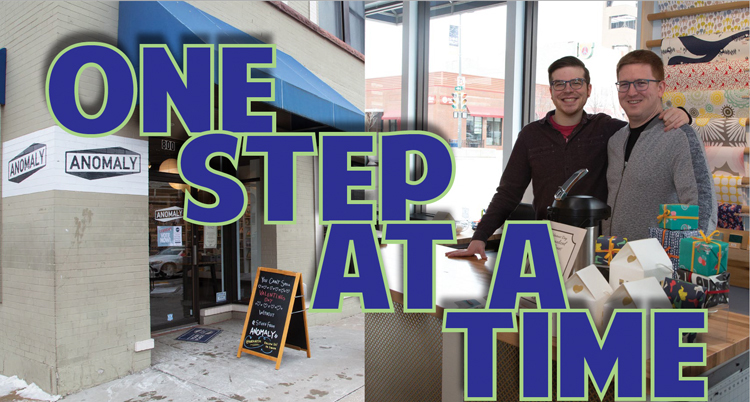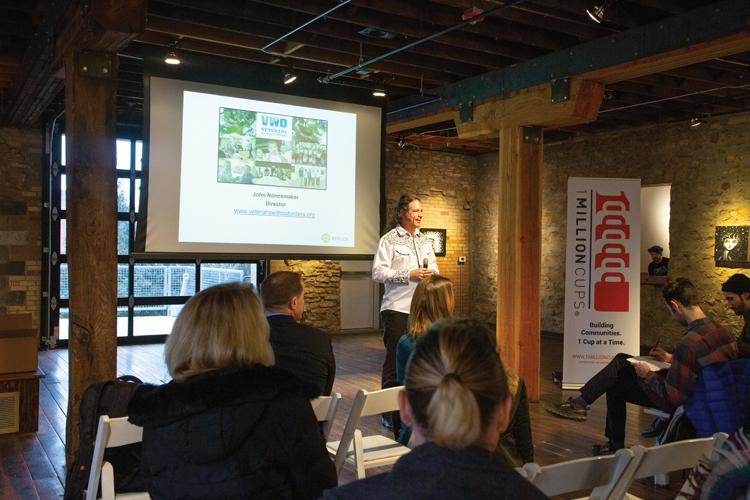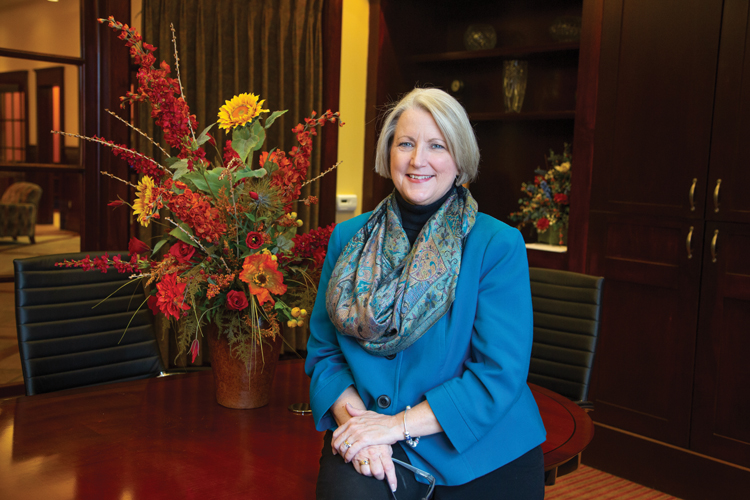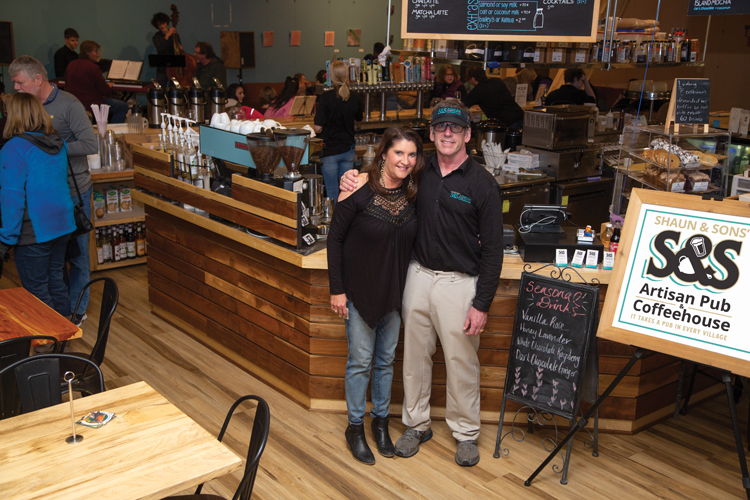Starting a new business can be a lengthy process that takes planning, diligence and a lot of cash.
| 2019 Q1 | story by Bob Luder | photos by Steven Hertzog

Anomaly owners Scott Lloyd and Chase Blackwood
Sitting in a small office space in the back of their new Mass Street gift shop, Chase Blackwood and Scott Lloyd appear to be a couple laid-back, easygoing guys. Talking and smiling easily, chuckling at each other’s comments and recollections, they seem to have the dispositions needed to tackle starting two businesses at once in a competitive Lawrence marketplace.
Most of the time, anyway.
“I’m mostly a T-shirt and jeans type,” Blackwood says. “When I went to my first bank asking for money, I wore a T-shirt and jeans. I got turned down.”
Blackwood laughs about the memory now, but back then he knew he wasn’t going to make the same mistake twice. For bank visit No. 2, he wore his best pinstriped suit and successfully secured the loan he and Lloyd needed to start Anomaly, a gift shop that sells anything from books to bath and office supplies, to toys—even gold-colored skulls. The store opened April 21 of last year at the southeast corner of Eighth and Massachusetts streets, and has been going gangbusters since.
“It’s a good store for someone who can’t quite figure out what it is they want to buy for someone else,” Lloyd says.
Blackwood and Lloyd, who in addition to business partners have been domestic partners the last 10 years, also started Harbor Leaf Tea Co., which sells subscriptions online for exotic international teas and is run out of that small back office.
As Blackwood puts it, he and Lloyd were a perfect fit for this particular undertaking. Blackwood was a software engineer who has worked in e-commerce and online retail. Lloyd has worked in traditional retail. Both had a desire to branch out and create a business—or, in this case, businesses—on their own.
“Our goal was to run our own business and have more freedom,” Lloyd says.
Blackwood adds, “This doesn’t really feel like a job. It’s like working on your house.”
Like some of those difficult home projects, starting a business is filled with seemingly infinite tasks and details that almost always seem daunting and, oftentimes, insurmountable.
“I don’t think we realized how much work there is to do constantly,” Blackwood says. “I would say the secret is to just take one thing at a time.”
It Started With an Idea
Lloyd says the first thing he and Blackwood did in starting the business was to sit down and discuss exactly what it was they wanted to sell.
“There was a lot of brainstorming about what’s going to work, what’s feasible,” Blackwood explains.
After doing a lot of research online, they wrote out articles of incorporation and a basic business structure. Then they had to decide how they were going to fund everything.
“We decided to do a small business loan,” Blackwood says. “So now, we have to convince someone else that we have an idea that can work.”
This time adorned in his finest pinstripe, Blackwood took the couple’s 10-page business plan to the second bank and discovered that, for any loan to be finalized, they needed to have a location and signed lease. But the landlord of the building they chose for the location of Anomaly wanted money in hand before signing a lease. Blackwood and Lloyd had enough savings to cover the deposit, and they got their lease and loan.
The next step was to find a general contractor to begin creating the space that would become Anomaly. Through a friend, they found someone to come in, tear out the teller windows that remained from a bank, which once occupied the site, and build a new wall near the back that separates the retail space from the office. Blackwood and Lloyd say they did most of the flooring, shelving, painting and finishing work themselves.
The partners worked with their contractor on obtaining all the proper city permits as well as the inspection process.
“I took a site plan down to the permit office,” Blackwood says. “They needed to know occupancy, how many people can stand outside for fire codes.”
All the contract work was paid for out of Lloyd’s and Blackwood’s own pockets, Lloyd says. The loan money all went toward the companies’ inventories. They say they work with 150 vendors and place orders with about 80 of them on a regular basis.
“I spend a lot of time poring over catalogs, going to gift shows,” Lloyd says. “When I find one thing that’s really cool, I find that vendor and then see what else they have to sell.”
Remarkably, Anomaly and Harbor Leaf opened about one month after Blackwood and Lloyd secured their loan.
“The benefit of owning your own business is that you can throw everything into it,” Blackwood says. “You don’t have to get agreement from a bunch of people to get things done.”
During much of the process, Blackwood and Lloyd say they received immeasurable advice and assistance from the Kansas Small Business Development Center (SBDC) at the University of Kansas and SBDC regional director Will Katz.
“Will was a huge help,” Lloyd says. “He was great to bounce ideas off. He gave us a good direction. At first, we were going to decide on just one of the businesses, but he told us we should do both.”

Will Katz speaks at A Million Cups event at the Cider Gallery
Helping Develop Small Business
There are about 1,100 Small Business Development Centers across the country, 14 in Kansas, and Katz has been regional director of the center at KU for the last 12 years. He estimates he’s helped some 2,000 clients, including Blackwood and Lloyd, during that time.
The Kansas SBDC at KU operates as part of the University’s School of Business and partners in assigning master’s in business administration students with small businesses for internships and/or jobs.
Much of Katz’s time, however, is spent assisting people interested in starting companies understand what it takes to put together a business plan and make a business financially viable.
“I think the process begins with what I call the three ‘Ms,’” Katz says. “Management. Can you run a business? Marketing. Will people buy your product? And money. Do you have the capital you need to execute your vision?”
It’s that third “M” that trips up a lot of prospective entrepreneurs, Katz says. Gaining access to capital can be a difficult challenge. Most find that starting a business is more expensive than originally thought. And you’d better have a great credit score to take to potential investors or banks.
“There’s a bit of mythology out there that you start a business with (other peoples’ money),” Katz says. “I have people come in here and say, ‘I want to start a coffee shop on Mass and do it debt-free.’ I ask, ‘Do you have $300,000 readily available?’
“Finding people who are going to invest in your business is far, far more rare than people think,” he continues.
That doesn’t mean Katz discourages anyone from trying. The general macroeconomic climate for new business in Lawrence is better than many other places, he says. Just make sure you’ve done the proper market research and use every tool available to access capital. Being successful in business, he says, comes down to self-awareness, work tolerance, being down to earth and a good communicator, and being a great assessor of risk.
“Like anything, make the plan, then execute the plan,” he says. “There will always be deviations. It requires adaptability and resilience.”

Tim Metz (right), Senior Vice President Central Bank of the Midwest jams with JJ Hanson, the owner of Beautiful Music Violin Shop.
Banking on the Bank
Tim Metz, senior vice president, commercial lending at Central Bank of the Midwest, says the first step in securing a loan from any bank is pretty cut-and-dried.

Cynthia Yulich, President Emprise Bank.
“The first thing I ask for is a business plan,” he says. “Who, what, why, when. It can be as simple as, ‘What do you want to do? How do you plan to tackle the challenges?’ Basically, I want a story about what you want to do.”
Metz says a business plan serves a secondary purpose of being a reference document, of what you intend to do when you open the door of your business that first day. The plan is always flexible, he says, and open to revision annually. But it’s a road map that’s vital to the start of any business.
“How do you know where you are unless you know where you’ve been?” he asks.
Cynthia Yulich, market president for the Lawrence branch of Emprise Bank, adds that a detailed business plan is the basis for collecting much more information that helps the bank believe any business has a good chance at success. Details such as cost of the start-up, ongoing personnel and capital needs, collateral and bottom-line profit are all important pieces lenders consider, as are understanding an applicant’s education and business experience.
“Once the bank and borrower identify gaps in any of these areas, they can begin the discussion of what tools are available to bridge those gaps,” Yulich says. “The more prepared a potential entrepreneur is, the more likely the bank will be able to help them reach their goals.”
Metz points out that, according to Small Business Administration statistics, 30 percent of all new businesses fail within the first two years. That number jumps to 50 percent within the first five years and 66 percent within the first 10.
“Businesses poised for success are the ones that take the time to do it right,” he says.
Experience Can Help
There might not be anyone in Lawrence who knows more about starting up a new business than Shaun Trenholm.
When he opened Shaun & Sons Artisan Pub and Coffeehouse last year, it was the fourth business he’d started over the last 37 years. It all started when he helped create and open the West Coast Saloon with a couple friends while still in college in 1981. “The Coast,” as locals refer to it, thrives near the corner of 23rd and Iowa streets to this day. There also was Booster Print, a shirt-printing and embroidery business that still exists, and Silver Ridge Catering, which doesn’t, along the way. That led to Shaun & Sons, commonly referred to as S&S, which opened June 6 in the space next door to the west of the West Coast Saloon.

Lori and Shaun Trenholm, owners of S&S Artisan Pub and Coffee House.
Each creation has been its own unique experience, Trenholm says. With the West Coast Saloon, he says he was “just there” following the lead of his partners. By the time he decided to open S&S, he was a seasoned proprietor. He already owned the building and had the available capital to finance the start-up himself.
“It’s not always what I’ve done,” Trenholm says, “but if I were to tell someone (how to begin the process of starting a business), I’d say make a plan. You’re not going to get help from a bank if you don’t have a solid business plan.”
“Things are always going to take longer and cost more,” he continues. “There are so many dominos. You’re always waiting for one guy to call you so you can call another.”
It’s always nice to have friends to lean on who have prior knowledge about starting a business, and Trenholm says he received a ton of advice from Bob Schumm, a former Lawrence mayor, city commissioner and business owner. But most of the process, from demolition and construction to licensing and permits, he already knew from operating his prior businesses.
Still, Trenholm says it was a good three years from the genesis of S&S as an idea in his head to opening for business. In one regard, he agrees completely with the approach Blackwood and Lloyd took in opening Anomaly and Harbor Leaf.
“It’s real easy to get caught up in looking down the road,” he says. “It’s important to really focus on one thing at a time.”
